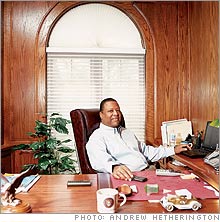Calculate your risk Lesson 2, Corollary 2: If you see an opportunity, take it. But that doesn't mean betting the ranch.
NEW YORK (Money Magazine) -- It is probably no coincidence that of the 23 people who granted me interviews, 14 had started their own business. In a classic study of nearly 3,000 entrepreneurs who had recently become business owners, 81 percent predicted that their odds of success were seven out of 10 or better, despite being fully aware that statistics put their chances far below that. (A hopeful 33 percent said their odds were 10 out of 10.)
Most of the people I met told me that if you're going to take big risks, you must believe to your core that you're going to succeed. That's no guarantee that you will, of course, but without that faith, your chances are nil. And yet the more I talked to people, the more I noticed that often the risks they took weren't wild at all. That's true of Rich Miletic, and also of Ron Irvine, 55, whom I met on an overcast day in the leafy Chicago suburb of Lake Forest. He made his fortune by taking a big leap early in his career - but he took a long look first. By 1987, Irvine had reached a spot in the corporate hierarchy where he could have remained for a long time. He was the director of market planning and research at G.D. Searle, the pharmaceutical company. It was a comfortable spot with a good salary, but high enough up in the organization that there wasn't much room for growth and promotion. "As a young African-American director, I didn't see a lot of steps ahead of me," he told me, sitting in the plush living room of his neat brick home on a cul-de-sac. "I decided to set my own sails." He launched Irvine Consulting that year, and within four years he had seven employees and revenue of $2.3 million. Going solo may have seemed rash at the time - he had two young children - but Irvine had accumulated knowledge not only of the pharmaceutical business but of how Searle hired consultants. He knew what corporations were looking for in the outside firms they hired to help with marketing and concept testing. He knew how generously the consultants were paid. And he knew what his colleagues thought of the work they paid for. "I used to hire consultants," he said. "I had rewritten enough of their reports to know that there were people out there making a living doing this who weren't doing it as well as I could." When he started his own firm, Irvine wasn't exhibiting risky behavior like, say, deciding that because you're a good cook, you're going to put every penny you can get your hands on into a restaurant (a business with a notoriously high failure rate). Rather, it was classic growth mind-set: Recognize an opportunity, weigh the possibility of failure against the chance of success, act accordingly, and reap profits. That mind-set can create a universe of possibilities in your life: jobs you might land, romances you might encounter, investments you might get a piece of and, quite possibly, fortunes you might make. Either by nature or through practice, those 23 strangers I met across the country were open to new ideas and new people. And so, naturally, they opened their doors. _________________________________ Lesson 1: Make your own luck...Beverly Hills, Calif. 90210 Lesson 1, Corollary 1: Make others lucky too...Paradise Valley, Ariz. 85253 Lesson 2: Have a growth mind-set...Westport, Conn. 06880 Lesson 2, Corollary 1: Never stop learning...Atherton, Calif. 94027 Lesson 2, Corollary 2: Calculate your risk...Lake Forest, Ill. 60045 |
| ||||||||||||

